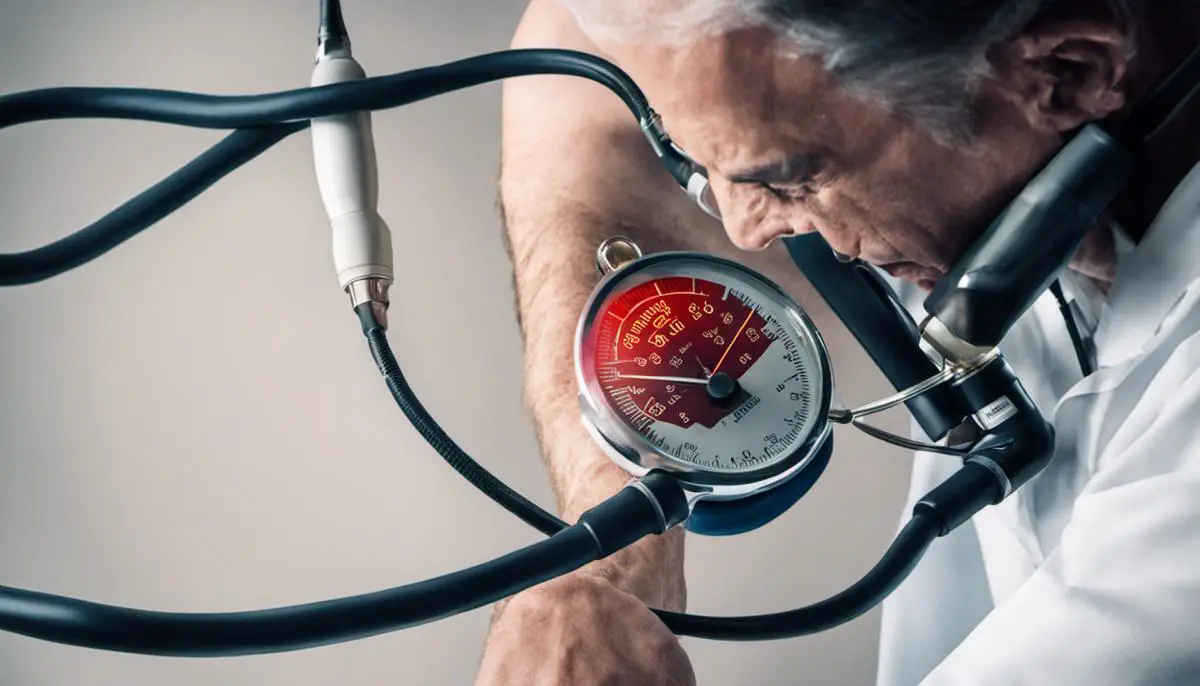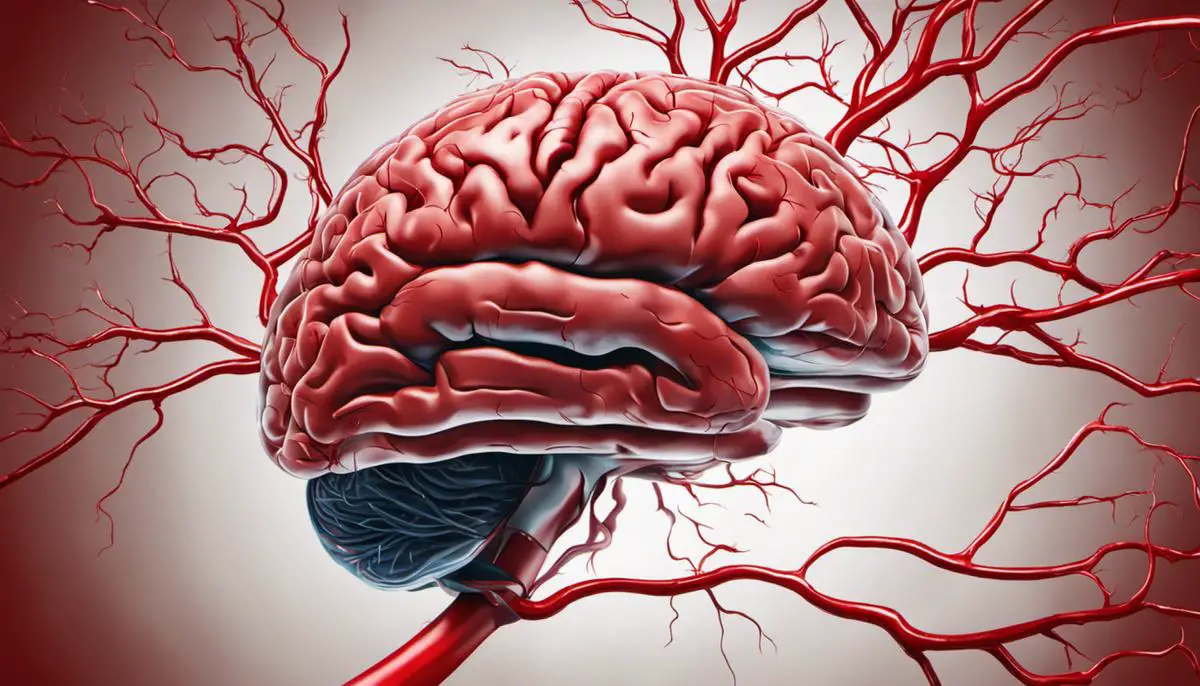In the quest for optimal health and longevity, understanding the impact of high blood-pressure and its connection to strokes is paramount. More than a simple health metric, high blood pressure, also known as hypertension, can turn into a silent killer if left unchecked. The correlation between hypertension and strokes is substantial as enduring high blood pressure can contribute to the damage of blood vessels, consequently restricting the flow of blood to the brain. This article will delve into high blood pressure, the potential risks associated with it, important lifestyle modifications for its management, the variety of medication options available, and the critical importance of routine tracking and follow-ups with healthcare professionals.
Understanding High Blood Pressure and its Correlation to Strokes
Understanding High Blood Pressure and its Risks
High blood pressure, also known as hypertension, involves the force of your blood persistently too high against your artery walls. This condition, when left uncontrolled, can lead to severe health problems, among them damages to the blood vessels and the heart. High blood pressure is of particular concern as it often exhibits no apparent symptoms, thus earning it the moniker, the “silent killer.”
One of the most significant risks of uncontrolled high blood pressure is stroke.
This condition impedes the regular flow of blood to the brain, leading to an impaired supply of oxygen and vital nutrients. Over time, unchecked high blood pressure can cause blood vessels to weaken, narrow, or burst, resulting in a higher chance of suffering a stroke.
Causes of High Blood Pressure
There are diverse causes for high blood pressure. Some of these are linked to genetic predispositions, aging, obesity, lack of physical activity, tobacco and alcohol use, excess intake of salt and fats, certain medical conditions like kidney disease, and some medications. Stress can also serve as a trigger, causing temporary hikes in blood pressure levels.
Symptoms and Detection
Unfortunately, high blood pressure often presents no visible symptoms until severe damage is done. For this reason, regular check-ups are a necessity to ensure early detection and timely intervention. Some people with extremely high blood pressure may exhibit signs such as nasal bleeding, severe headaches, chest pain, fatigue, vision problems, irregular heartbeat, and difficulty breathing.
Managing High Blood Pressure to Prevent Strokes
Effective management of high blood pressure, thereby averting the risk of stroke, can be achieved through an amalgamation of lifestyle changes, medication as prescribed by a healthcare provider, and regular monitoring. A diet rich in fruits, vegetables, lean protein, and whole grains, along with reduced sodium intake, is recommended. Regular physical exercise, stress management activities like meditation or yoga, consistent maintenance of a healthy weight, and refraining from tobacco and excessive alcohol are also measures to control high blood pressure.
In many cases, lifestyle modifications alone may not be sufficient to manage high blood pressure, especially if it’s particularly high or has been elevated for a long time. Therefore, medications provided under a healthcare provider’s expert advice are essential as part of the management plan. Medications can range from diuretics, beta-blockers, calcium channel blockers to ACE inhibitors and others.
Monitoring and Regular Check-ups
Routine check-ups and regular monitoring of blood pressure are crucial to keep abreast of the condition’s progression or regression. Home blood pressure monitoring devices are handy for individuals with high blood pressure. They allow for frequent measurements during different times of the day, thus offering a comprehensive picture of the blood pressure levels.
Hypertension, known as high blood pressure, is a health condition that warrants everyone’s attention, and especially those with a family history of related diseases like diabetes, heart, or kidney ailments. Regular checkups for blood pressure can ensure early detection, enabling timely management of the condition. This can significantly diminish the risk of severe complications, such as stroke. As each individual is different, it is recommended to consult a healthcare provider for advice and strategies personalized to your health status and lifestyle for effectively managing high blood pressure.

Lifestyle changes for Managing High Blood Pressure
Adapting Your Diet for Better Blood Pressure Management
One notable strategy for managing high blood pressure centers on making essential changes to one’s diet. The Dietary Approaches to Stop Hypertension (DASH) plan is highly recommended by health professionals. This heart-healthy plan includes fruits, vegetables, whole grains, lean protein, and low-fat dairy products, and it advises limiting foods high in saturated fats and cholesterol. Another effective technique is cutting back on sodium; keeping salt intake below 2,300 milligrams per day can bring about a significant decrease in systolic blood pressure. Additionally, having potassium-rich foods like bananas and oranges can help maintain the body’s salt balance, further aiding in managing high blood pressure.
Increasing Physical Activity
Regular physical activity is another crucial component in managing high blood pressure. Engaging in moderate-intensity exercise such as walking, cycling, or swimming, for at least 150 minutes a week or vigorous-intensity exercise for 75 minutes a week can significantly lower blood pressure. Regular exercise strengthens the heart, reducing the pressure on the arterial walls and consequently lowering the blood pressure.
Limiting Alcohol and Tobacco
High alcohol intake and smoking can both cause high blood pressure. Limiting alcohol to moderate levels – up to one drink per day for women and up to two for men – can lower systolic blood pressure. Quitting smoking is a must, as nicotine raises your blood pressure and heart rate and narrows your arteries.
Stress Management
Chronic stress can contribute to high blood pressure. While more research is needed to determine the effects of chronic stress on blood pressure, it’s known that stress can lead to poor habits that increase blood pressure, such as poor diet and excessive alcohol consumption. Techniques such as deep breathing, yoga, meditation, and other relaxation exercises can help manage stress levels.
Maintaining a Healthy Weight
People who are overweight or obese are at a higher risk for high blood pressure. By losing even a small amount of weight, one can see a significant drop in blood pressure. It’s recommended to keep a healthy weight by calculating Body Mass Index (BMI) and aiming to stay within the healthy range (18.5-24.9).
In order to effectively manage high blood pressure and prevent strokes, incorporating lifestyle changes is essential. It’s important to bear in mind that any changes made should meld seamlessly into your routine and be sustainable for long-term success in high blood pressure management.

Medications for High Blood Pressure
Demystifying High Blood Pressure and its Link to Strokes
Often termed hypertension, high blood pressure is a health condition where the blood applies excessive force on the artery walls that could potentially lead to various health issues. It’s one of the top causes increasing the chances of experiencing a stroke, given its damaging effects on brain blood vessels. Stroke can happen when the brain’s blood supply gets interrupted, preventing the delivery of much-needed oxygen and nutrients. This situation can result in a catastrophe—death of brain cells possibly leading to permanent brain damage, disability, or in severe cases, death.
First-Line Medications for Hypertension Management
Several classes of medications are commonly used to manage high blood pressure. Some of the most frequently prescribed include Diuretics, Angiotensin-converting enzyme (ACE) inhibitors, and Calcium channel blockers.
Diuretics, also known as water pills, work by making your kidneys excrete more sodium and water. This reduces the volume of blood that needs to be pumped, thereby reducing the pressure on your artery walls. However, they can cause dehydration and electrolyte imbalances, among other side effects.
ACE inhibitors, on the other hand, work by decreasing the production of angiotensin, a substance that narrows blood vessels and releases a hormone that can increase the amount of sodium your body retains. By inhibiting this substance, these drugs can help widen blood vessels and reduce the volume of blood that your heart has to pump. Side effects can include a persistent dry cough and increased potassium levels.
Calcium channel blockers stop calcium from entering the cells of the heart and blood vessel walls, leading to lower blood pressure. Potential side effects include heart palpitations, swollen ankles, and constipation.
Potential Drug Interactions in Hypertension Management
Drug interactions can significantly affect the efficacy and safety of high blood pressure medications. For example, some common over-the-counter drugs, like certain pain relievers and decongestants, can increase blood pressure. Some prescription drugs can also have similar effects, or they might interfere with the effectiveness of blood pressure medication. It is essential to have regular follow-ups with your healthcare provider and to discuss all your current medications to prevent any potential drug interactions.
Importance of Lifestyle Changes Together with Medication
In addition to medication, lifestyle modifications are a critical component of high blood pressure management. These can include regular exercise, a healthy diet low in sodium and high in fruits and vegetables, maintaining a healthy weight, quitting smoking, and limiting alcohol intake. These measures complement the effect of medication in lowering blood pressure and reducing the risk of stroke.
High Blood Pressure Management: A Never-Ending Objective
Dealing with hypertension or high blood pressure effectively requires ongoing surveillance and consultation with a healthcare specialist, strict compliance with prescribed medications, and a dedication to a wholesome lifestyle. It’s an enduring task that substantially minimizes the chances of experiencing a stroke whilst bettering overall health.

Regular Tracking and Follow-Up
Grasping the Links Between Hypertension and Stroke
Hypertension, or high blood pressure as it’s more commonly known, is a grave health risk that amplifies the vulnerabilities to encountering various health problems, including strokes. Hypertension is a condition that occurs when the force exerted by blood as it moves through your vessels is excessively high on a persistent basis. This chronic and relentless pressure can inflict harm on the vessels and ultimately precipitate health issues.
A stroke is a medical emergency that arises when the blood supply to any part of your brain is halted abruptly. As a result of the stoppage, the brain cells, deprived of oxygen and vital nutrients, begin to perish swiftly, causing lasting disability or even death. It’s worth noting that hypertension is a major causal factor contributing to both occurrences of strokes and deaths related to strokes.
Hypertension Management
Efficient management of hypertension is critical in minimizing the risk of stroke. Proper management includes a combination of lifestyle modifications as well as possible antihypertensive medications, which work by relaxing and dilating blood vessels, reducing resistances and lowering blood pressure.
Lifestyle changes include maintaining a healthy weight, regular physical activity, a diet rich in fruits, vegetables and low-fat dairy products, limiting sodium and alcohol intake, and avoiding tobacco use. These changes can help lower your blood pressure and decrease your risk of stroke significantly.
Monitoring Blood Pressure
Regular blood pressure monitoring and follow-up visits with healthcare providers are vital for managing hypertension and preventing strokes. At-home monitoring can help you keep a closer look at your blood pressure. It is important to use a home blood pressure monitor appropriately and record results accurately.
Frequent check-ins with healthcare providers ensure that your blood pressure remains within the target range. During these visits, healthcare professionals can assess the effectiveness of your current hypertension management plan and make adjustments as needed.
Importance of Regular Doctor Visits
Regular healthcare provider visits serve several roles in managing hypertension. They present an opportunity to monitor blood pressure trends over time, assess the effectiveness and side effects of prescribed medications, adjust dosage or medication as needed, and reinforce the necessity of lifestyle changes for blood pressure control.
Adhering to the treatment regimen and maintaining regular visits with your healthcare provider, even when feeling well, will aid in early detection of any changes in blood pressure. It will also provide an opportunity to discuss any concerns or challenges in managing hypertension.
Thus, the management of high blood pressure to prevent strokes underscores the critical need for a painstaking approach that combines both patient and healthcare provider efforts in monitoring hypertension. Through this collaborative approach, the vast health risks associated with high blood pressure, such as stroke, can be markedly reduced.

Regardless of where you are on your journey, maintaining a healthy understanding and awareness of high blood pressure management can prove to be life-saving. Comprehending its function and the consequences of leaving it unattended presents a profound base for making informed decisions. Precisely implementing positive lifestyle changes, understanding the role of medications, and reviewing the necessary regular check-ups with your healthcare provider all contribute to this. Knowledge is power, and when it comes to high blood pressure management and stroke prevention, it’s a power that could quite frankly save your life.
